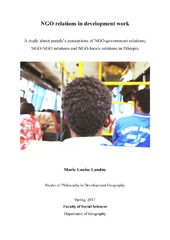| dc.description.abstract | Research on relations between development NGOs and actors like government and locals are meaningful for good utilization of knowledge and resources in development work. The legitimacy of NGOs is said to be based on a universal mandate to help people get a better life. However, this study aims at proving that research on NGO relations on an individual level is a meaningful way of gaining understanding about these relations. This study explores the perceptions on NGO relations through informants both inside and outside the NGO world in Ethiopia, through the overarching research question: Which perceptions exist of NGO relations in Ethiopia? NGO relations is a difficult term to measure. However, drawing inspiration from humanistic geography and the philosophy of phenomenology, the study uses semi-structured interviews and field conversations to explore people’s perceptions, experiences, opinions and feelings on NGO relations, as a means to contribute to greater insight on the theme. Increasing validity of the study, questionnaires and some standardized questions during interviews have been used to indicate the scope of the perceptions. The theoretical framework includes a literature review on the topics of NGO relations and role today. The study draws upon data collected during a two- month long field work in the research areas of Northern Amhara, Eastern Oromia and Addis Ababa in Ethiopia. In total, the study uses data collected from 122 participants. As phenomenological data and the theme analysis is subjective, my ability to generalize is limited. However, the findings within NGO-Government relations show a trend of NGO restrictions believed to be caused by political factors, in line with the theoretical framework and literature review. NGO workers perceive the Government both as an obstacle for development and as a necessary evil in a region characterized by unrest, and experience a “silent cooperation” with the government, through different strategies. The findings within NGO-NGO relations are divided. The NGO networks are perceived as expensive and ineffective, causing NGO leaders in the study to avoid memberships. Northern NGOs' relations to Southern NGOs are characterized by increasing trust and independency, in contrast to literature on relations between Northern and Southern NGOs. The findings within NGO-locals relations shows a “love/hate” relationship. On the one hand, the informants were satisfied with NGO work and expressed needs for NGO expansion. On the other hand, many believed NGO presence was an unwanted influence both culturally and politically. Hopefully, the study provides useful knowledge about people’s perceptions, experiences and opinions, and contributes with new insights to the NGO debate. | en_US |
